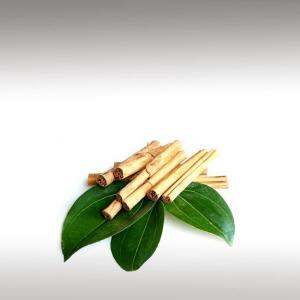
CEYLON CINNAMON ESSENTIAL OIL (CINNAMOMUM VERUM) - ESSENTIAL OILS

BASE / GENERAL DATA
Information submited: May 4, 2014 Modified: February 16, 2015 By: OperaDreamhouse
Cinnamon is a tropical evergreen growing up to 15m high, with
strong branches and thick scabrous bark with young shoots speckled
green-orange. It has shiny green, leathery leaves, small white flowers
and oval bluish-white berries. The leaves have a spicy smell when bruised. Botanical
Name: Cinnamomum verum
Common Method of Extraction: Steam Distilled Part Typically Used: Leaf or Bark (The bark oil should be avoided in topical applications.) Color: Golden Yellow/Brown It has a yellow tinge which is different from the red-brown Consistency: Slightly oily feeling Perfumery Note: MiddleStrength of Initial Aroma: Strong. Flat, warm, earthy spice.
The Cinnamon Leaf oil is extracted by steam distillation from the leaves and twigs. The leaves left after trimming the cut stems, as well as those obtained from pruning operations, provide the raw material for production of cinnamon leaf oil. They are usually allowed to dry for a few days before distillation.
Cinnamon Leaf Oil (Cinnamomum verum) has a warm, spicy aroma.
Cinnamon has been a highly prized commodity since antiquity and is one of the most recognizable scents in the world. The chemical breakdown of Cinnamon leaf oil is similar to that of Clove bud.
Extraction cinnamon oil:
The leaves and twigs or inner dried bark are subjected to steam distillation. The leaves yield 1.6 - 1.8 % and the bark 0.5 - 1.00 % oil. Usually this essential oil is extracted from the leaves, as it yields a more delicate oil.
Chemical composition:
The main chemical components of the essential oil, obtained from the leaves, are eugenol, eugenol acetate, cinnamic aldehyde and benzyl benzoate.
Cinnamon oil's benefit lies in its toning and calming effect on the respiratory tract, the nervous system, and in the easing of colds and influenza, as well as period pains.
Common Method of Extraction: Steam Distilled Part Typically Used: Leaf or Bark (The bark oil should be avoided in topical applications.) Color: Golden Yellow/Brown It has a yellow tinge which is different from the red-brown Consistency: Slightly oily feeling Perfumery Note: MiddleStrength of Initial Aroma: Strong. Flat, warm, earthy spice.
The Cinnamon Leaf oil is extracted by steam distillation from the leaves and twigs. The leaves left after trimming the cut stems, as well as those obtained from pruning operations, provide the raw material for production of cinnamon leaf oil. They are usually allowed to dry for a few days before distillation.
Cinnamon Leaf Oil (Cinnamomum verum) has a warm, spicy aroma.
Cinnamon has been a highly prized commodity since antiquity and is one of the most recognizable scents in the world. The chemical breakdown of Cinnamon leaf oil is similar to that of Clove bud.
Extraction cinnamon oil:
The leaves and twigs or inner dried bark are subjected to steam distillation. The leaves yield 1.6 - 1.8 % and the bark 0.5 - 1.00 % oil. Usually this essential oil is extracted from the leaves, as it yields a more delicate oil.
Chemical composition:
The main chemical components of the essential oil, obtained from the leaves, are eugenol, eugenol acetate, cinnamic aldehyde and benzyl benzoate.
Cinnamon oil's benefit lies in its toning and calming effect on the respiratory tract, the nervous system, and in the easing of colds and influenza, as well as period pains.
Information submited: July 8, 2014 By: OperaDreamhouse
Cinnamon oil is "Generally Recognized as Safe" by the FDA (Food and Drug Administration), and can be used in cooking. Start off with a single drop (or less, using a toothpick to grab a small amount) until you know your ratios.
Often the entire leaf is used as an ingredient to make herbal tea.
Often the entire leaf is used as an ingredient to make herbal tea.

SPIRITUAL PRACTISES DATA
Information submited: July 8, 2014 By: OperaDreamhouse
The Greek word 'Kinnamon' means 'tube' or 'pipe'. Cinnamon oil was used as a temple incense.
Emotionally and spiritually, cinnamon essential oil is related to the lower chakras and can encourage self-acceptance or self-confidence, sexual expression, and the clearing of trapped emotions from past trauma. It also correlates to our sense of safety and security, which when out of balance, can leave a person feeling jealous, insecure, controlling, or unable to be vulnerable in relationships.
The opposite of peppermint, cinnamon oil is very warming. Massage over your heart center, into the soles of the feet or around the neck for the best results.
Emotionally and spiritually, cinnamon essential oil is related to the lower chakras and can encourage self-acceptance or self-confidence, sexual expression, and the clearing of trapped emotions from past trauma. It also correlates to our sense of safety and security, which when out of balance, can leave a person feeling jealous, insecure, controlling, or unable to be vulnerable in relationships.
The opposite of peppermint, cinnamon oil is very warming. Massage over your heart center, into the soles of the feet or around the neck for the best results.

MEDICINE / HEALTH DATA
Information submited: July 8, 2014 By: OperaDreamhouse
Cinnamon is one of the most popular herbs for flavoring and medicinal uses. The herb, owing to its vast medicinal uses, has found a prominent position in traditional medicines, especially in Ayurveda. Egyptians used it for foot massage, as well as a remedy for excessive bile. It was also used as an ingredient for mulled wines, love potions and as a sedative during birth.
Traditionally, cinnamon has been used in many cultures for treating a variety of health disorders including diarrhea, arthritis, menstrual cramps, heavy menstruation, yeast infections, colds, flu, and digestive problems.
Cinnamon is now being used all over the world for the treatment of a variety of health disorders including respiratory problems, skin infections, blood impurity, menstrual problems, and various heart disorders.
This spicy essential oil has great value in aromatherapy and it fights exhaustion and a feeling of depression and weakness. It has powerful anti-rheumatic properties, is useful in the digestive system.
findings from laboratory studies and animal-based research indicate that compounds found in cinnamon essential oil may help destroy Streptococcus mutans (a type of bacteria closely linked to the development of cavities), promote widening of the blood vessels (and, in turn, possibly aid in the treatment of high blood pressure), and control diabetes (in part by regulating blood sugar levels).
Diabetes:
Cinnamon oil has been shown to help regulate blood sugar. Add to your food, take 1-2 drops within an empty capsule, or use for self massage over the area of the pancreas. Diffusing this in the air on a regular basis is uplifting and supports the immune system. You can also use it topically, or in a bath. Depending on the type of infection you can massage the diluted cinnamon bark oil into the soles of the feet, over the area of concern, or simply diffuse throughout the area. For instance, a 2003 study published in Diabetes Care found that taking cinnamon supplements every day for 40 days reduced blood sugar and cholesterol levels in patients with type 2 diabetes.
Vaginal Infection/Vaginitis:
Diluted cinnamon oil may assist in fighting infections. Be sure to check for sensitivity and use caution. Start by massaging over the lower abdomen and groin area, avoiding contact with genitals.
Cinnamon oil may be useful as a topical treatment for infections and other skin problems, including benign tumors.
In vapor therapy, cinnamon oil can be used in acute bronchitis and colds. Cinnamon oil can be used in blended massage oil, or diluted in the bath, to assist with bronchitis, diarrhea, chills, infections, flu, rheumatism and arthritis.
Cinnamon oil has been shown to have powerful antimicrobial and cancer-fighting properties.This essential oil is quite promising as an alternative treatment for cervical cancer, colorectal cancer, melanoma and lymphoma.
The researchers suggest that cinnamon oil may be very useful as a natural treatment for inflammation.
Due to its very powerful antiseptic properties it is good for fighting any infectious diseases. It furthermore has great value in calming spasms of the digestive tract, nausea and vomiting. It stimulates secretion of digestive juices, while easing muscular and joint pains associated with rheumatism and arthritis. Care should however be taken not to irritate the skin and mucus membranes.
This essential oil is very good to use for Prevent Urinary Tract Infections.
Side effects:
Pregnant women and children should consult their primary health care providers prior to using essential oils. This oil is not suitable for children under 6 and should be diluted more for children over 6.
Traditionally, cinnamon has been used in many cultures for treating a variety of health disorders including diarrhea, arthritis, menstrual cramps, heavy menstruation, yeast infections, colds, flu, and digestive problems.
Cinnamon is now being used all over the world for the treatment of a variety of health disorders including respiratory problems, skin infections, blood impurity, menstrual problems, and various heart disorders.
This spicy essential oil has great value in aromatherapy and it fights exhaustion and a feeling of depression and weakness. It has powerful anti-rheumatic properties, is useful in the digestive system.
findings from laboratory studies and animal-based research indicate that compounds found in cinnamon essential oil may help destroy Streptococcus mutans (a type of bacteria closely linked to the development of cavities), promote widening of the blood vessels (and, in turn, possibly aid in the treatment of high blood pressure), and control diabetes (in part by regulating blood sugar levels).
Diabetes:
Cinnamon oil has been shown to help regulate blood sugar. Add to your food, take 1-2 drops within an empty capsule, or use for self massage over the area of the pancreas. Diffusing this in the air on a regular basis is uplifting and supports the immune system. You can also use it topically, or in a bath. Depending on the type of infection you can massage the diluted cinnamon bark oil into the soles of the feet, over the area of concern, or simply diffuse throughout the area. For instance, a 2003 study published in Diabetes Care found that taking cinnamon supplements every day for 40 days reduced blood sugar and cholesterol levels in patients with type 2 diabetes.
Vaginal Infection/Vaginitis:
Diluted cinnamon oil may assist in fighting infections. Be sure to check for sensitivity and use caution. Start by massaging over the lower abdomen and groin area, avoiding contact with genitals.
Cinnamon oil may be useful as a topical treatment for infections and other skin problems, including benign tumors.
In vapor therapy, cinnamon oil can be used in acute bronchitis and colds. Cinnamon oil can be used in blended massage oil, or diluted in the bath, to assist with bronchitis, diarrhea, chills, infections, flu, rheumatism and arthritis.
Cinnamon oil has been shown to have powerful antimicrobial and cancer-fighting properties.This essential oil is quite promising as an alternative treatment for cervical cancer, colorectal cancer, melanoma and lymphoma.
The researchers suggest that cinnamon oil may be very useful as a natural treatment for inflammation.
Due to its very powerful antiseptic properties it is good for fighting any infectious diseases. It furthermore has great value in calming spasms of the digestive tract, nausea and vomiting. It stimulates secretion of digestive juices, while easing muscular and joint pains associated with rheumatism and arthritis. Care should however be taken not to irritate the skin and mucus membranes.
This essential oil is very good to use for Prevent Urinary Tract Infections.
Side effects:
Pregnant women and children should consult their primary health care providers prior to using essential oils. This oil is not suitable for children under 6 and should be diluted more for children over 6.

BEAUTY / COSMETICS DATA
Information submited: July 8, 2014 By: OperaDreamhouse
Modern Essentials recommends using cinnamon oil aromatically (such as diffusing) or topically (diluted). Try massaging over the area of infection within a carrier oil. It's very important that you dilute this oil at least 1:3 (1 drop EO to 3 drops carrier oil).
Cinnamon Oil is a mucous membrane irritant and strong skin sensitizer. Although traditionally used for clearing warts, it is not recommended to be used in skin care products.
Cinnamon Oil is a mucous membrane irritant and strong skin sensitizer. Although traditionally used for clearing warts, it is not recommended to be used in skin care products.

FOOD / COOKING DATA
COMMENTS
No comments.


